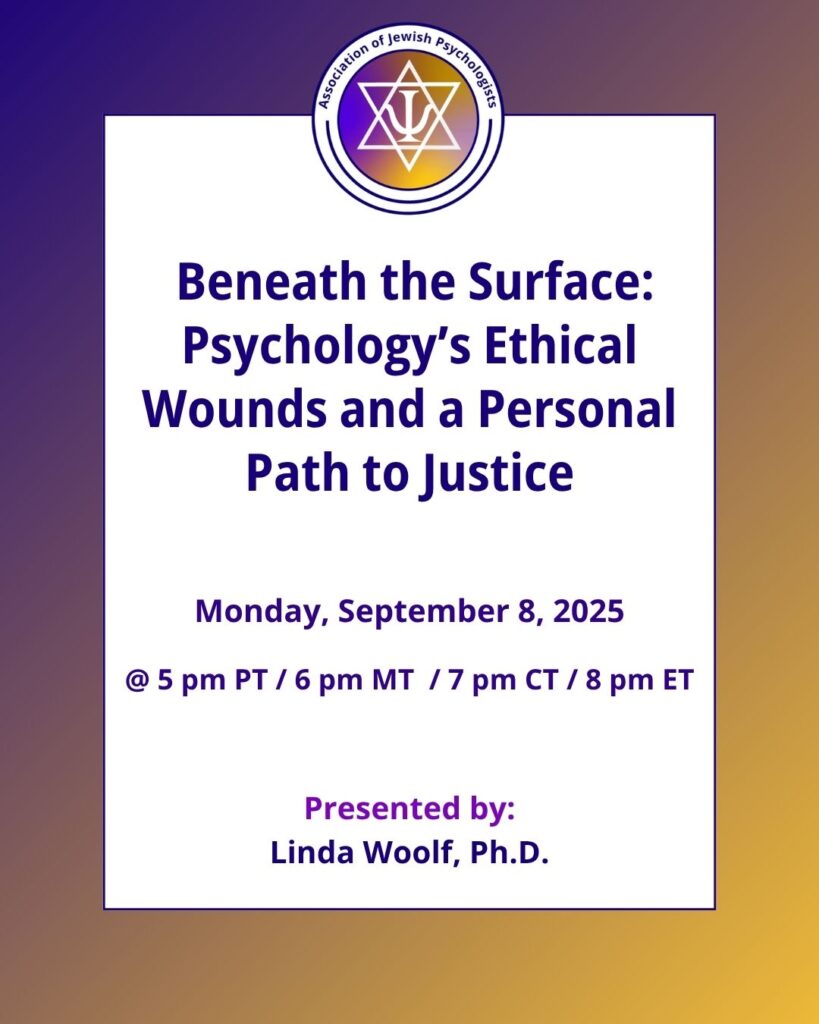This webinar is presented by Linda Woolf, Ph.D.
Date: Monday, September 8, 2025
Time: 5:00 pm PT / 6:00 pm MT / 7:00 pm CT / 8:00 p.m. ET
The webinar is approximately 60 minutes long, and the ZOOM link will be sent in the email confirmation when you register. We will also email you a few days before the webinar.
When I first began teaching psychology, I discovered that many of my undergraduate students knew nothing about the Holocaust, and others thought it had been exaggerated. Wanting to correct that problem, I attended Yad Vashem’s Holocaust Studies for Educators, as well as the Holocaust Educational Foundation’s Seminar in Eastern Europe. That education transformed my teaching of psychology as well as my understanding of psychology’s more destructive history. It led me on a path of personal and professional exploration, focusing on human rights, social justice, and ethics.
Psychology, like all sciences, does not exist in a vacuum. In this webinar, I explore the entanglement of psychology with eugenics, antisemitism, and racism, examining how the field has been both shaped by and complicit in some of the darkest chapters of the 20th century. I will trace the role of psychological theories and practitioners in supporting eugenic ideologies and policies, including those that laid the groundwork for Nazi atrocities. In parallel, I will explore the evolution of ethical standards in psychology—from the horrors of human experimentation to the development of formal ethical codes, and the continued need for transformative ethical guidance today. This webinar invites attendees to reckon with the past, reflect on our ethical responsibilities as psychologists today, and commit to a psychology grounded in human rights, justice, and remembrance.
Learning Objectives:
- Analyze the historical role of psychology in supporting and legitimizing eugenic ideologies, antisemitism, and systemic racism, which laid the foundation for Nazi atrocities.
- Trace the evolution of ethical standards in psychology, including key milestones in response to historical atrocities and abuses.
- Reflect on contemporary ethical responsibilities in psychology and articulate ways to promote a practice grounded in human rights, social justice, and respect for persons and peoples.

Linda Woolf, PhD, is Professor of Psychology and International Human Rights at Webster University and a Fellow of the American Psychological Association. Dr. Woolf is currently running for the 2026 President-elect position (see https://www.linda4apa.com) and serves on APA’s Council of Representatives and APA’s Ethics Code Task Force.
Previously, Dr. Woolf has served on APA’s Commission on Ethics Processes, Committee for Global Psychology, Committee of Teachers of Psychology in Secondary Schools, Diversity Education Resources Task Force, and Work Group on "Where Faculty Live: Internationalizing the Disciplines".
A past president of Divisions 2 (Society for the Teaching of Psychology) and 48 (Society for the Study of Peace, Conflict, and Violence), Dr. Woolf has also chaired APA’s Task Force to Reconcile Policies Related to Psychologists’ Involvement in National Security Settings and co-chaired the Indigenous Apology Work Group, which produced APA’s Report on an Offer of Apology to First Peoples in the United States.
Beneath the Surface: Psychology’s Ethical Wounds and a Personal Path to Justice
"*" indicates required fields



